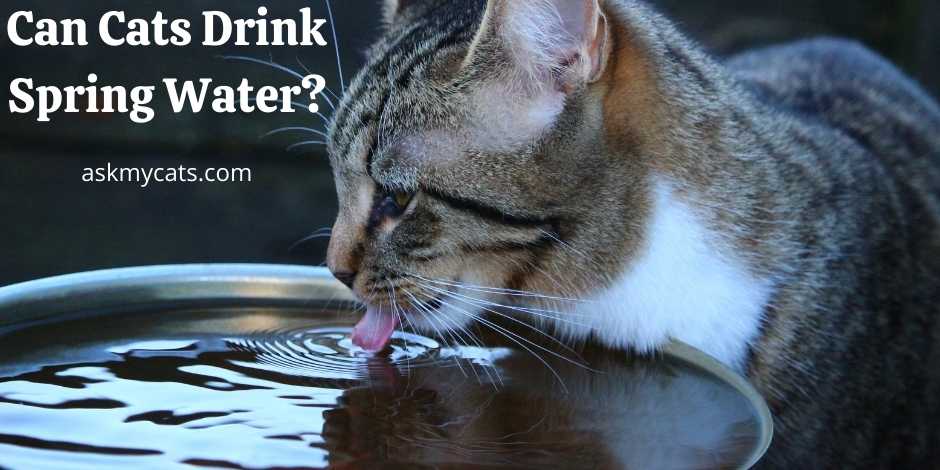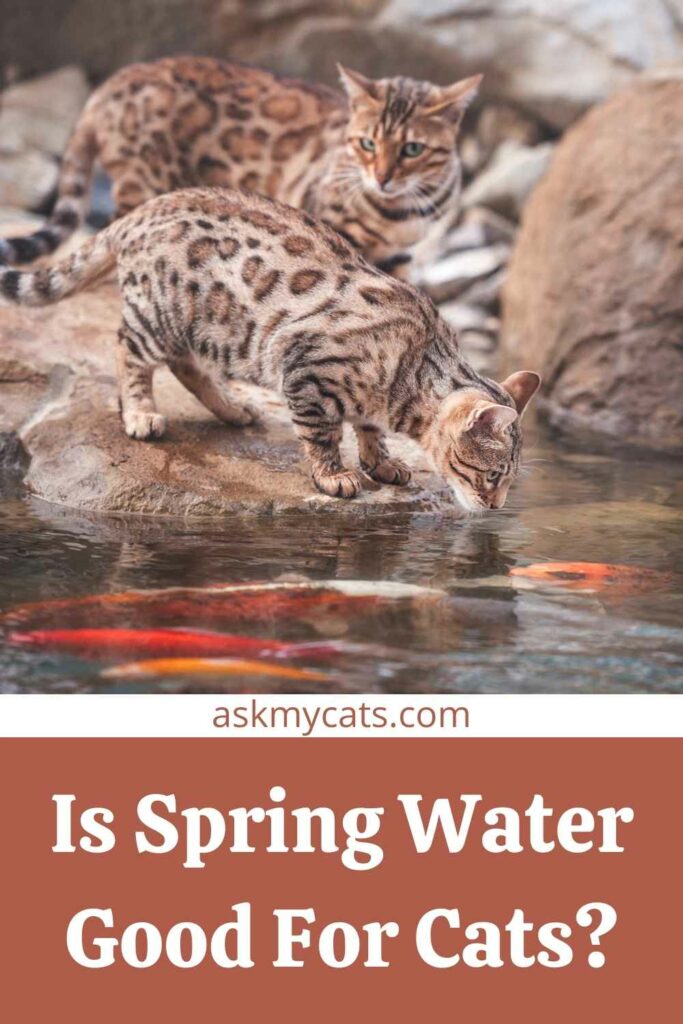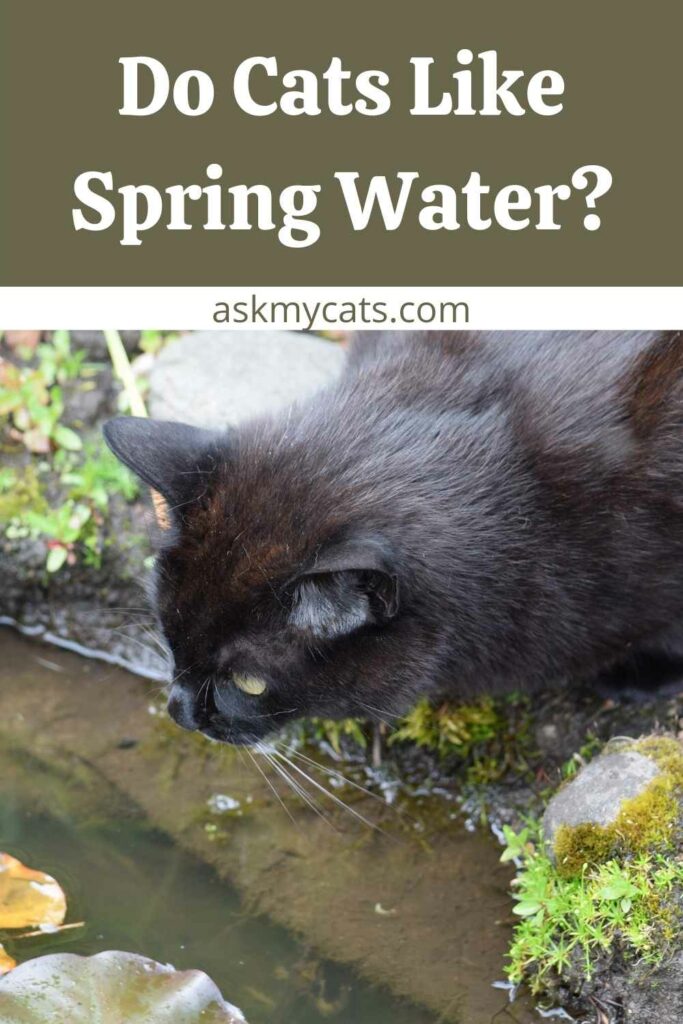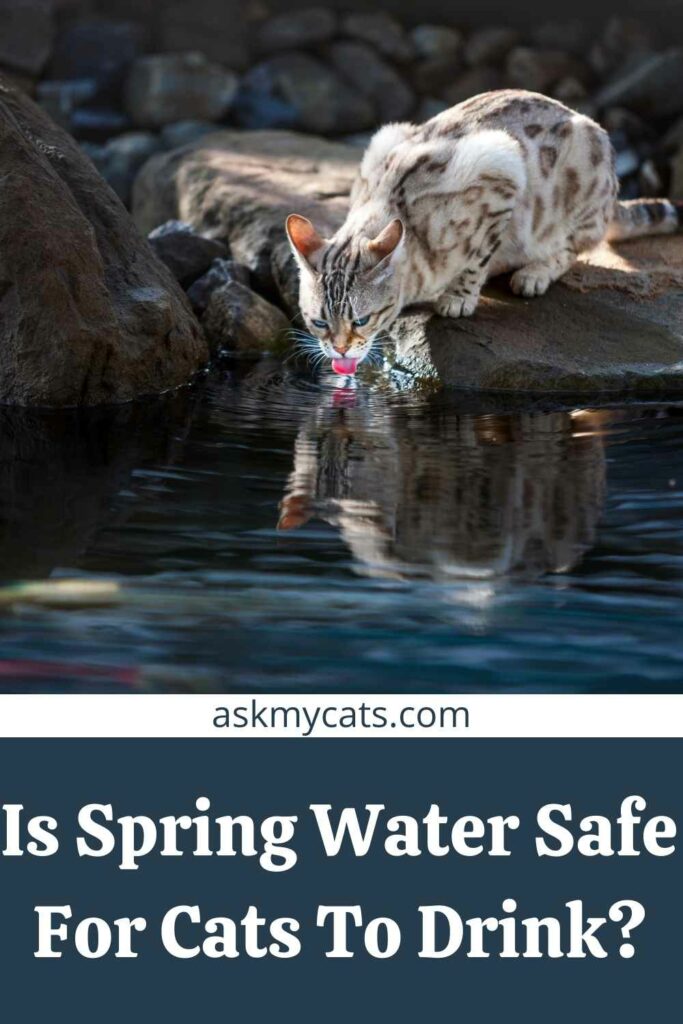It is critical for your cat’s health to have plenty, unrestricted access to fresh, clean water. Water is the basis of every critical system in your cat’s body, and as a result, it defines the quality of life for your cat. Have you considered the quality of your cat’s drinking water?
Cats can drink spring water because it is fresh and chemical-free. Your cat will benefit from hydration that is devoid of the pollutants present in tap water if you provide them natural spring water. This minimizes the chances of your cat going away from the water after sniffing it.
Now let’s talk about the advantages and disadvantages of providing spring water to cats.


Give Your Cat the Perfect Day
Get the Free Ebook!
Is Spring Water Good For Cats?
Spring water is good for cats because it includes natural vitamins and minerals that come from underground aquifers.

Mineral concentrations in mineral and distilled waters are insufficient for cats. You should also be aware of water kept in bisphenol A-containing plastic (BPA). BPA is a chemically comparable to thyroid hormones, which can create imbalances and disturbances in your cat’s health. It’s often added to plastics to aid with stiffness.
Tap water quality varies greatly from one municipality to the next. Because there is no upstream agricultural land, Denver tap water is significantly better than most–but it is still not ideal.
Chlorine by-products, fluoride, and dangerous pollutants like as bacteria, arsenic, chemical runoff, toxic herbicide and pesticide residue, heavy metals, rocket fuel or even radiation, which may be found in cities near military or nuclear sites.
The water in some cities tastes awful, but flavour isn’t always a trustworthy sign of what’s truly in it. In fact, some of the tastiest waters are also among the cleanest.
Spring water is the ideal choice for cats if it comes from a natural spring and the spring itself is of excellent quality.
According to a survey by the Natural Resources Defense Council, 25% of bottled water is simply bottled tap water that has been further treated or not.
Many generic and grocery store brands tested positive for bacteria and chemical pollutants, therefore they should be avoided. Perrier and Evian, two designer imports, passed the test with flying colours.
The best approach is to give your cat filtered water from the tap. Most undesirable scents and tastes for your cat may be removed with a simple filter that attaches to your faucet or comes in a pitcher that you refill.
A drinking fountain is another excellent technique to supply water to your cat. These feature filters that remove contaminants from the water while also keeping it flowing so germs can’t develop.
Fountains can also stimulate higher water intake since cats prefer to drink moving water over standing water. When you initially get a fountain, keep your cat’s former water source available until you’re sure she’ll drink from it reliably.
Do Cats Like Spring Water?
Yes, cats like drinking spring water.

Since it is chemical-free, water bottled fresh from a spring is better for cats to consume. Plastic bottles, on the other hand, can leach dangerous chemicals and poisons into the water. Give your cat spring water from a glass or cardboard box, or choose a bottle made of polyethylene terephthalate (PET).
Although mineral water is superior to tap water, it is not the best option. As previously said, not all mineral water is created equal. You should concentrate on increasing the quality of tap water unless you are purchasing a reputable brand.
Bisphenol A (BPA), a chemical often found in plastic water bottles, is another source of worry. BPA has been linked to mutations and health risks in animals and people, according to Environmental Science and Technology.
While some of these issues have been addressed, and disinformation is counterproductive, many scientists still advise against utilising the material in plastics. Examine the label of a plastic bottle for a recycling emblem with a number within. A resin identification code is what it’s called.
Carbonated water produces more intriguing bubbles than water that is entirely motionless, which may encourage a cat to drink. Unfortunately, cats should not drink sparkling water on a daily basis. When consumed in excessive numbers, this water can induce unpleasant stomach bloating.
The greatest way to entertain your cat is to use sparkling water. The majority of felines will spend hours staring at these bubbles. Continue to encourage your cat to drink still water when it comes to hydration.
Is Spring Water Safe For Cats To Drink?
Yes, spring water is safe for cats to drink if given in right quantities.

It’s best to avoid flavoured water from the store because it’s usually loaded with sugar. Worse, they frequently contain artificial sweeteners like xylitol.
According to the Journal of Veterinary Pharmacology and Therapeutics, unlike dogs, cats are not affected by xylitol poisoning. Regardless, it provides no benefit — and may even hinder hydration. Fruit attracts felines, yet they are unable to detect sweetness.
Flavoured bottled water, such as strawberry or watermelon, may also entice a hesitant cat. If your cat dislikes plain water but enjoys the fragrance of fruit, it may be more willing to drink on a regular basis.
That isn’t to say you can’t flavour your cat’s water on your own. Infusing tap water with fruit scent may entice cats to drink. The scent will draw curiosity while masking any existing copper or chlorine odours.
Avoid making fruit-infused water your go-to beverage. If cats become accustomed to this aroma, they will be less likely to drink ordinary water, even in an emergency like dehydration.
Furthermore, fruit-infused water has the potential to be sticky. Cats are efficient drinkers who produce little waste and spillage. Water can and can adhere to a cat’s snout, attracting flies with its taste.
Domesticated cats have a natural aversion to standing water. Cats in the wild drink from streams to ensure a constant supply of water. This explains why many cats have an odd inclination to drink from the toilet.
There might be another reason for your cat’s refusal to drink from the tap. Consider whether any of the following reasons justify your failure to hydrate before spending money on mineral water and polluting your house with plastic.
Clean, pure water is all that matters to cats. This implies that anything left out for more than an hour may be considered filthy or stagnant.
Cats are inquisitive creatures, and spicy odours may appeal to them as a way to make water more fascinating. However, it’s more likely that the cat will be uninterested in the water. If another cat has used the bowl, this becomes more likely.
Cats have a greater sense of smell than humans, up to 16 times stronger. While this is advantageous when hunting, it is injurious to the pleasure of tap water. Every chemical employed by the local water utility to keep the liquid safe may be detected by cats. B
efore it reaches a cat’s bowl, tap water will almost always be treated with the following chemicals:
- Liquefied chlorine
- Sodium silicofluoride
- Aluminium sulphate
- Fluorosilicic acid
- Calcium hydroxide
Most felines will avoid drinking because of the odours produced by these substances. This is why your cat approaches its water bowl, sniffs, and then walks away. The quickest approach to fix this problem is to purify, distil, or filter the water.
Reposition the basin and serve new tap water. Keep this on a different floor of the house from any food if at all feasible. In an apartment, this will be impossible. In this case, the room’s opposite corner will serve.
The most important aspect of this technique is to keep nutrients and hydration separate. Cats seldom drink just after they eat. Even if they do, cats will rather walk to a distant site than fulfil their nutritional and hydration needs.
Can Cats Drink Bottled Spring Water?
Bottled spring water should be avoided for cats because as the plastic in bottles contains harmful chemicals and they can contaminate the water.
Ordinary bottled water can be polluted, although it typically isn’t, and any water from a plastic container can have microplastics, including distilled water, which has no minerals and no chlorine.
Frequently Asked Questions
What kind of water do cats like?
Plastic bowls can pollute the water, thus cats prefer to drink from ceramic, glass, or metal bowls. Some cats prefer to drink from a natural water source outside, maybe because the taste of chlorine bothers them. You may gather rainwater and give it to your cat to drink.
Do cats prefer cold water?
Cats often prefer cold water to warm water because they believe cold water is fresher. Replace your cat’s water on a frequent basis to keep it cool. If the weather is especially hot, you may even put a few ice cubes in the bowl.
Do cats really need a water fountain?
The majority of the moisture that wild cats require comes from the animals they hunt. Indoor cats need drink enough of water since they can’t capture mice, birds, or other prey. Provide a water fountain for your cats to encourage them to drink more.
Final Words
Spring water which is fresh water drawn from springs is not as pure as it appears. Regular water consumption is not only crucial for optimal hydration, but it also provides your pet with the minerals and electrolytes that he or she may need if he or she is a picky eater.
If you have any questions, ask us in the comments section.

IS VOLVIC MINERAL WATER GOOD FOR CATS
It is generally not recommended to give cats mineral water or any other type of water that is not specifically designed for them. Cats can be very sensitive to changes in their diet and drinking water that is not designed for them can cause digestive upset and other health problems. It is best to provide your cat with fresh, clean water that is specifically designed for their dietary needs.